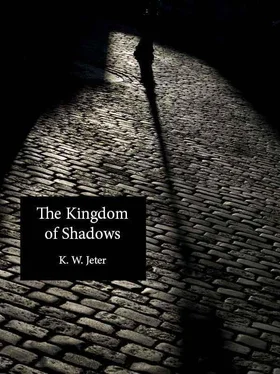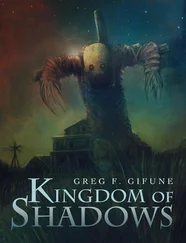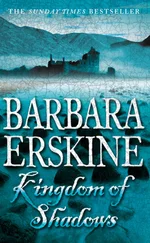K Jeter - The Kingdom of Shadows
Здесь есть возможность читать онлайн «K Jeter - The Kingdom of Shadows» весь текст электронной книги совершенно бесплатно (целиком полную версию без сокращений). В некоторых случаях можно слушать аудио, скачать через торрент в формате fb2 и присутствует краткое содержание. Жанр: Триллер, на английском языке. Описание произведения, (предисловие) а так же отзывы посетителей доступны на портале библиотеки ЛибКат.
- Название:The Kingdom of Shadows
- Автор:
- Жанр:
- Год:неизвестен
- ISBN:нет данных
- Рейтинг книги:5 / 5. Голосов: 1
-
Избранное:Добавить в избранное
- Отзывы:
-
Ваша оценка:
- 100
- 1
- 2
- 3
- 4
- 5
The Kingdom of Shadows: краткое содержание, описание и аннотация
Предлагаем к чтению аннотацию, описание, краткое содержание или предисловие (зависит от того, что написал сам автор книги «The Kingdom of Shadows»). Если вы не нашли необходимую информацию о книге — напишите в комментариях, мы постараемся отыскать её.
The Kingdom of Shadows — читать онлайн бесплатно полную книгу (весь текст) целиком
Ниже представлен текст книги, разбитый по страницам. Система сохранения места последней прочитанной страницы, позволяет с удобством читать онлайн бесплатно книгу «The Kingdom of Shadows», без необходимости каждый раз заново искать на чём Вы остановились. Поставьте закладку, и сможете в любой момент перейти на страницу, на которой закончили чтение.
Интервал:
Закладка:
The Kingdom of Shadows
K. W. Jeter
Du Seele bist dem Lichte gleich,
Das himmelwarts die Heimat ahnt
Und, kampfend mit dem Schattenreich,
Sich doch zu Gott die Wege bahnt…
Soul, you are like the Light
That senses its home to be heavenwards
And, battling with the kingdom of shadows,
Yet makes its way to God…
- Frank Wysbar (1899-1967), “The Ferryman’s Song” from the film Fahrmann Maria (1936)BERLIN
1936
Betwixt the press of shadows and the blood…
- George Chapman (c. 1559 – 1634), trans. (1616), The Odyssey, Book XIONE
He had never seen anything else as beautiful. A photograph in a shop window – if he was not yet old enough to be initiated into the faith of his fathers, then she would be his angel of light.
His brother Matthi knew, smiled, but did not mock. “When you are older, Pavli.” Matthi had already entered the world of adults. “Then you shall know a lot of things.”
Matthi had taken pity on him and had shown him a secret, a mystery. Undoing the tight, three-buttoned cuff of his shirt – all the Lazarene men wore shirts with cuffs like that – Matthi had pushed his sleeve up and shown Pavli his wrist. The soft inner skin had still been reddened and sore from the slow, patient needles, but the tattooed wound was starkly visible, a dark blue line a few inches long, thick in the middle, tapering at the ends.
“You see?” Matthi had shown him the tattoo on his other wrist as well. “That’s how you know it’s true. These people who call themselves Christians – they think the nails went into His palms. But that’s not how it was done. It was through the wrists.”
That made sense, the way Matthi had explained it to him. The weight of a man’s body – and God had been a man then, for a little while – would have torn the hands around the nails, rags of blood and small bones, and dropped them free. The stronger wristbones made for a proper crucifixion.
Such were the things of which the Lazarenes alone knew the truth. The dark components of their faith. Matthi knew of those things, or at least some of them. The secrets in which he’d been instructed by the elders. Already, Matthi no longer looked like a boy; he was a man, who knew the things of men. He had grown a head taller than his little brother, and his shoulders had broadened, as though to carry the burden of that invisible knowledge. The gaze in Matthi’s eyes had turned thoughtful and distant, already seeing the light of some world more real than the one held by the net of Berlin’s interwoven streets. And Matthi’s voice was both deeper and quieter now, befitting the words that spoke of the Savior’s true death and life, that those outside the Lazarene faith knew nothing of.
Sometimes, Pavli felt afraid to grow up, afraid of that day when he would be initiated into the faith of the Lazarenes as his brother had been. What if learning those dark mysteries meant that he must lose her, the beauty of the shop window?
The shop was his uncle Turro’s – the sign above the door read JOSEFSOHN, which was what his uncle had made of their family name Iosefni. That was not part of the Lazarene faith, but something they did to survive: they hid among those others who were not as they were. They became inconspicuous, walked in shadows, kept their secret ways to themselves. And were always ready to leave again.
One street off the Franzosische Stra?e, still in sight of the elegantly dressed promenaders, Arthur Josefsohn sold cameras. Rolleis and Leicas, clever machines of silvery metal and black folding bellows, deep polished lenses. It was one of the first camera shops in all Berlin.
“You see, Pavli,” his uncle had told him. “That’s why the Gaje get confused, and think we’re Jews.” He’d used the old word that meant the ones who aren’t the same as us, the word the gypsies in their rolling wagons used for people who lived in cities. “Because we have to make money any way we can. They think it’s cleverness, but it’s really just desperation.”
He knew what Jews were, and that these were not good times for them. A shop down the street from his uncle’s had its windows smashed and Juden Raus splashed across the front in red paint. People had stood around laughing when the owner had cursed and shaken his fist at a pack of brownshirts, then been kicked and pummeled to the ground. The blood had still been wet and sticky on the paving stones, glistening with splinters of glass, when Pavli had knelt down and touched it with his fingertips.
Pavli heard more of such things when he came to work in the shop. The Lazarene elders had talked about what was to be done with the two orphaned boys, Pavli and his brother, and their uncle had stepped forward to take them in.
“Why didn’t they live forever?” He had asked Matthi that as they stood with the hems of their trousers getting wet from the graveyard’s tall damp grass. “Some people do.”
“Don’t be stupid,” his brother had said. This was years ago, when their father had been buried beside their mother. “Nobody lives forever. Not even among the Lazarenes.”
Pavli didn’t know if that was true or not. Some things were mysteries. When you are older – his brother had promised him that. Then you shall know. As before, the thought of receiving such knowledge brought dread into Pavli’s gut.
Dread, and also a longing that couldn’t be quenched. To know, to know everything.
That desire had led him to do a shameful thing. To spy upon his own brother. This had not been a dream; Pavli had done it in the daytime, a few weeks after Matthi had been taken into the secrets of the Lazarene faith and become a man by their beliefs.
Pavli had slipped away from the shop and gone back to the little flat they lived in with their uncle. Where he had known his brother would be. He had been able to open the bedroom door silently, just a crack, and peer in. To where Matthi had stood in front of the dresser mirror, with his shirt stripped off. The ritual tattoos, the blue-black wounds of Christ, had shown fresh and stark on Matthi’s pale body. The wrists and the other, longer mark that went down the ribs, the symbol of the Roman soldier’s lance piercing Christ’s side – Pavli had already known about that, had seen the markings when they had both undressed for bed.
He had watched as his brother had dug his fingertips into the soft flesh of his forearm. Then Matthi had lifted his hand, peeling away his own skin.
But not the body’s skin. No blood, but instead a gossamer substance, fluttering slowly as more of it came loose. Like the sleeve of an angel’s gown, if angels were to be seen naked beneath their bright raiment. In the curtained shadows of the bedroom, the secret thing glowed with its own subtle radiance.
Matthi had loosened his hand from a glove of the silky matter. The empty shape of his arm, freed from the heavy flesh, drifted upward. His other hand had peeled away a swath from his shoulder and his neck, then had started on his jaw, when his eyes had glanced into the mirror and spotted the small face of his brother at the door’s edge.
“You should be ashamed!” Matthi had grabbed him before he could run away. “You’re not to know these things! Not yet!”
Pavli had cried, battered by his own fear. Not of his brother’s sudden rage, but of that empty thing drifting near the bedroom’s ceiling, the transparent form of his brother’s arm and the blind fragment of his face.
Matthi’s anger had ebbed. He stroked his little brother’s hair. “Don’t be afraid.” He’d tried to comfort the weeping Pavli. “It’s all right. I won’t tell anyone.” The words had been awkward, hard to find. “I… I wasn’t supposed to be doing that. Not by myself.”
Читать дальшеИнтервал:
Закладка:
Похожие книги на «The Kingdom of Shadows»
Представляем Вашему вниманию похожие книги на «The Kingdom of Shadows» списком для выбора. Мы отобрали схожую по названию и смыслу литературу в надежде предоставить читателям больше вариантов отыскать новые, интересные, ещё непрочитанные произведения.
Обсуждение, отзывы о книге «The Kingdom of Shadows» и просто собственные мнения читателей. Оставьте ваши комментарии, напишите, что Вы думаете о произведении, его смысле или главных героях. Укажите что конкретно понравилось, а что нет, и почему Вы так считаете.












